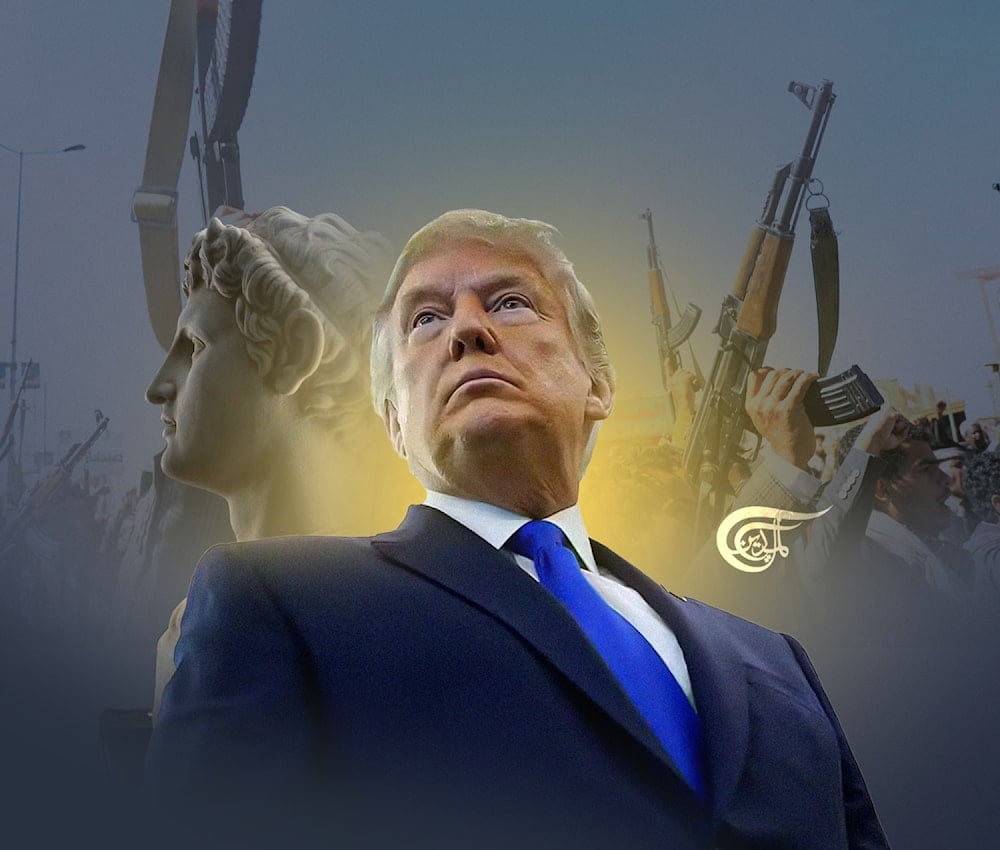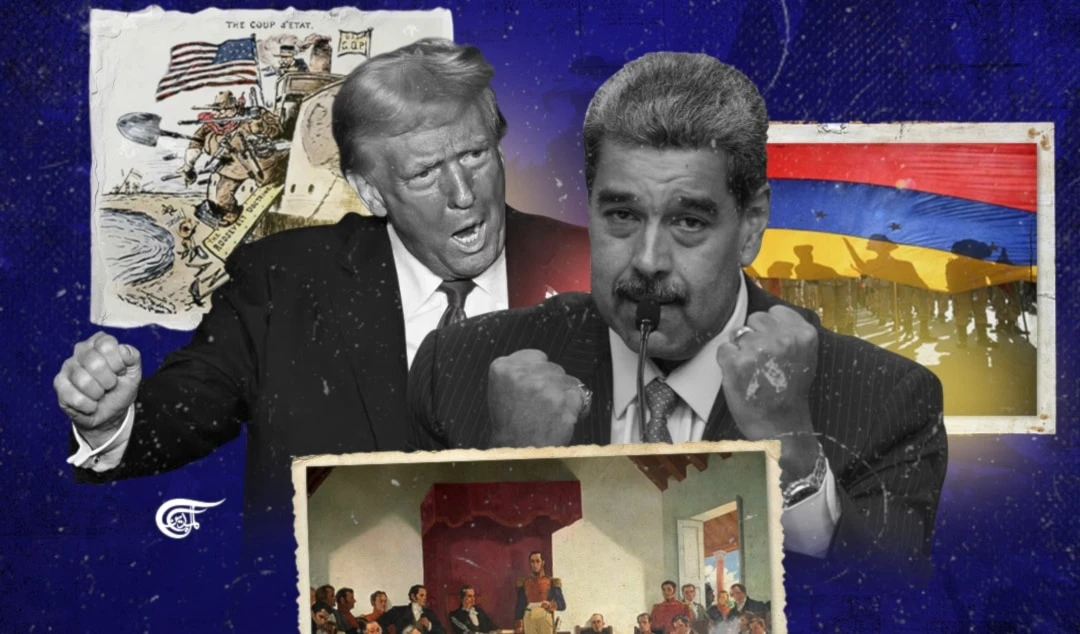Narcissistic imperialism and the fight against it: the role of the Resistance
Alexander Tuboltsev examines how ancient lessons on narcissistic rulers apply to today’s Western imperialism, arguing that the US-Israeli aggression meets its strongest counterforce in the steadfast Resistance across West Asia.
-

How can we not recall the modern example of malignant political narcissism in the person of Donald Trump? (Al Mayadeen English; Illustrated by Mahdi Rtail)
Sometimes, works written in ancient times are striking in their relevance. For example, the biography of the Hellenistic ruler Demetrius Poliorcetes, written by the famous ancient philosopher Plutarch, is remarkably interesting from the perspective of political psychology.
Demetrius Poliorcetes was known for his arrogance and inflated self-esteem. This was mentioned not only by Plutarch, but also by the ancient Greek historian Diodorus Siculus. From a modern perspective, Demetrius can be described as a political narcissist. A notable example is his treatment of the city of Athens, where he received incredible honors after taking control of the city. The Athenians erected statues in his honor, granted him de facto unlimited power, renamed one of the months of the year after him, and the Athenian nobility competed to satisfy Demetrius's ego with new honors. Demetrius clearly enjoyed being the center of attention. However, fate had other plans, highlighting the fragility of power based on political narcissism.
After his defeat at the Battle of Ipsus, Demetrius attempted to retreat and return to Athens. During the battle, the former generals of Alexander the Great, the Diadochi, defeated Demetrius and his father, Antigonus, who was ultimately killed in the battle. Demetrius, who had lost many of his men and suffered a crushing defeat, faced a new challenge when the Athenians refused to accept him back into their city, effectively stripping him of all his previous honors and praise. Few people were willing to lend a helping hand in his time of need. Demetrius was largely responsible for this, due to his arrogant and extravagant style of governance.
In his political activities, Demetrius often combined the seemingly incompatible: generosity and cruelty, honesty and treachery, but he often made mistakes and repeatedly lost important battles, although he had an amazing ability to quickly regain his strength. However, narcissism was a constant feature of his character, evident in his attitude towards his pompous titles and his willingness to accept all sorts of exaggerated honors from the cities under his control. It was on this example that Plutarch criticized the style of government based on political narcissism and insincere pompous honors bestowed upon the ruler.
How can we not recall the modern example of malignant political narcissism in the person of Donald Trump? His manic desire for attention, his inflated self-esteem, his excessive boasting... This is nothing like the ancient political narcissism of Demetrius, which had a certain element of tragedy (in the ancient Greek sense of the term). Trump's narcissism is more like a caricature, an absurd show, a grotesque one-man theater. But in my opinion, it is also a reflection of the American upper political class.
The Democratic and Republican parties take turns in power, and the names of the presidents change (Bush, Obama, Biden, Trump, and others), but the essence remains the same. It is the malicious political narcissism and the manic idea of their own exceptionalism that underlie the worldview of the American political elite. This worldview often takes on a hyperbolic form.
From history, we remember that the United States has been engaged in colonial expansion since its founding. US troops have attacked Native Americans, invaded Mexico (1846-1848), Haiti, Samoa and the Philippines, and wreaked havoc and destruction in various parts of the Western Hemisphere since the 19th century, justifying their bloodthirsty interventions with the Monroe Doctrine. At the same time, the American imperialist doctrine of "manifest destiny" emerged, which was based on the idea of establishing US dominance and hegemony over territories in Latin America and the Pacific.
Colonialism (and, since the 20th century, neocolonialism) has become the foundation of the worldview paradigm of the United States' political elite. The entire modern American policy is a chronicle of imperialist interventions aimed at gaining control over natural resources, territories, and trade routes. The colonial arrogance towards other nations and the desire to expand the hegemonic "city on a hill" have long been at the core of the imperialist mindset of the American establishment.
From this imperialist and neo-colonialist mindset of the American political elites stems their narcissism, overestimation of their own capabilities, and attempts to present themselves as representatives of an allegedly "exceptional" country, class, or social group. The pursuit of opulence and luxury, aggression and arrogance towards foreign nations, and constant boasting and self-conceit are traits that we have witnessed in the American leadership over the past few decades.
Political and financial dynasties, as well as elite families, have emerged in the United States, and they resemble the phenomenon of feudal times. Moreover, the United States' obsession with hegemony and its attempt to portray itself as the "suzerain of the planet" seems to be a hyperbolic reflection of the feudal social structures of the past, based on the principles of suzerainty and vassalage.
If we put aside the external, decorative side of American political reality (the pompous rhetoric about "democracy" and "freedom", the election scandals, and the information leaks) and look a little closer, we will see the following picture. As in the 19th century, the American colonial octopus continues to wrap its tentacles around entire continents, controlling a network of military bases, corporations, and intelligence centers across the world. At the head of this monstrous political structure is a narcissistic elite that treats other nations around the world with contempt and denies the right of foreign countries to sovereignty and their own independent positions.
The American imperialist octopus is stretching its tentacles towards new targets around the world, from rare-earth metal deposits to the transport corridor in the South Caucasus. The actions and deeds of the Western neo-colonizers are becoming increasingly aggressive. As the world is rapidly changing and the old world order is crumbling, the United States and its associated oligarchic circles and corporations are trying to prevent the unjust unipolar world from disappearing. In order to maintain their hegemony, they are literally trying to stop the course of history. However, as we know, the cyclical nature of history is inexorable. The empires of the past, including colonial empires, eventually fell into crisis and collapsed. In the future, the collapse of American neocolonialism and imperialism is also inevitable.
In these circumstances, the Resistance in Gaza, Lebanon, and Yemen is a real barrier that protects sovereign nations from American-Israeli aggression. It is here that we see examples of incredible bravery and heroism, which have historical significance. It is the Resistance that is the vanguard of the forces of justice, waging a courageous struggle for national liberation against the destructive forces of imperialism.
I especially emphasize the role of the peoples of Palestine, Lebanon, Yemen, and Iran in building a new, more just, and multipolar world and in defending their sovereignty. The courageous Palestinian struggle in Gaza and the heroism of the Hezbollah fighters in Lebanon inspire free and honest people all over the world. In difficult circumstances and under enemy attacks, the Resistance continues to operate, thus protecting all of strategically important West Asia from falling under US-Israeli occupation.
The Resistance is a flame ignited in the hearts of millions of people from Gaza and Beirut to Tehran and Sanaa, a will to fight for justice, freedom, and sovereignty. Hostile forces want to extinguish this fire, but it is unquenchable and eternal. All attempts by Western imperialists and Zionists to destroy the Resistance are doomed to fail in the long run.
This is a very important time, and future generations will evaluate and analyze its significance. It is a time of tectonic changes in the global economic and political system. As narcissistic, kleptocratic Western imperialism and its satellites attempt to maintain a unipolar dictatorship, the Resistance has become an essential and vital element in the fight against corrupt neocolonial hegemony.
At present, we are witnessing an attempt by American imperialism to push forward its expansionist plans in order to delay the peak of the systemic crisis into which the United States is increasingly sinking. Trump is imposing massive tariffs on foreign countries, engaging in trade wars, and at the same time attempting to gain control over trade and transportation routes (such as the strategically important transportation corridor in the South Caucasus).
Additionally, the United States is involved in the destabilization of West Asia by sponsoring the criminal Zionist regime that has occupied territories in Palestine and Syria. The strategy of the American imperialists is to gain direct or indirect control over the natural resources and transportation routes of Western Asia. Similarly, they are also active in other parts of the world, trying to extend their influence to Southeast Asia and Latin America in order to use it against China.
Once again, the Resistance plays a crucial role in this global struggle. The fighters of the Palestinian factions, Hezbollah in Lebanon, and Ansar Allah in Yemen are defending their countries and peoples, fighting for the oppressed and in the name of justice. Their courage has thwarted and overthrown the treacherous plans of the Zionist regime and its Western sponsors.
Let's look at the example of Syria. This country with a rich history and culture found itself in a terrible situation. It is torn apart by internal conflicts, part of its territory is occupied by Zionists, and barbaric attacks against national and religious minorities (in particular, Alawites) regularly occur in the republic. This is a terrible picture of the fragmentation of the state, and the main initiators and organizers of this chaos are the United States and "Israel".
Looking at this, we understand that the Resistance has every moral right to use armed self-defense against American-Israeli aggression. The Resistance's weapons protect the safety of entire nations.

 Alexander Tuboltsev
Alexander Tuboltsev
 9 Min Read
9 Min Read











